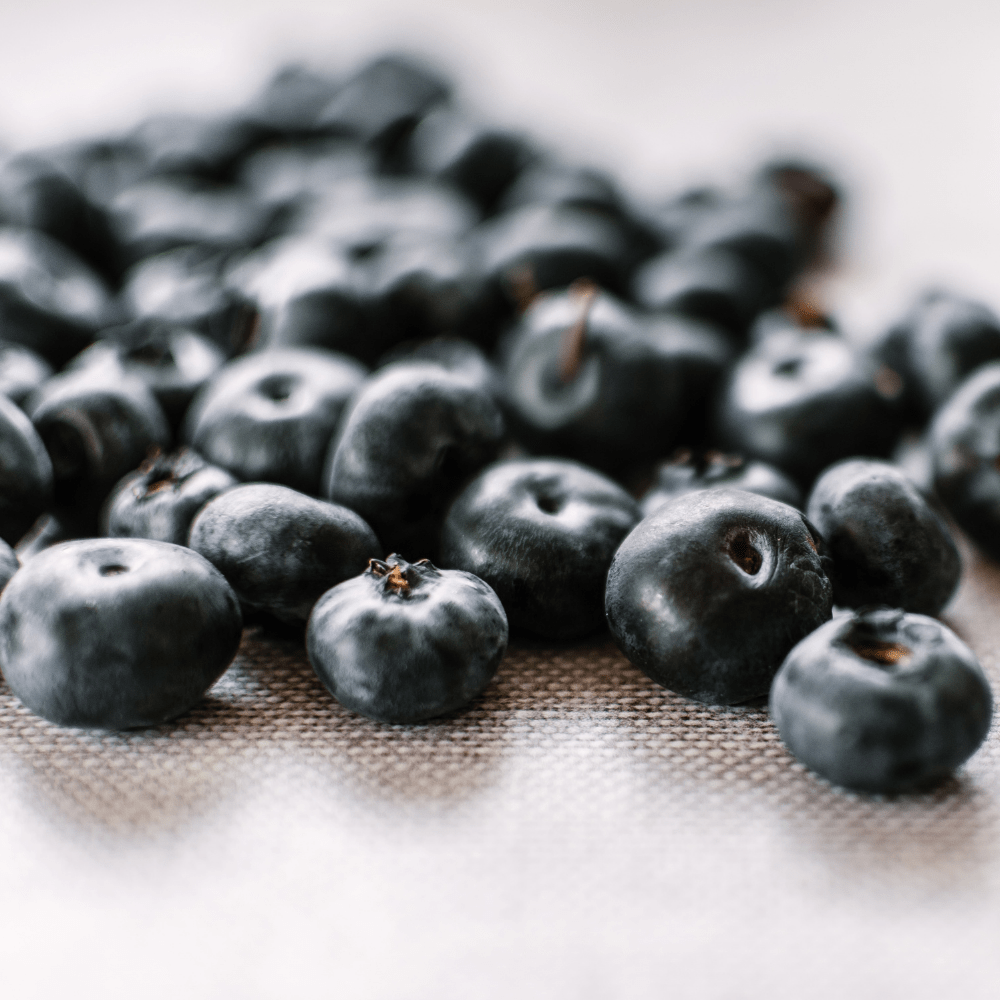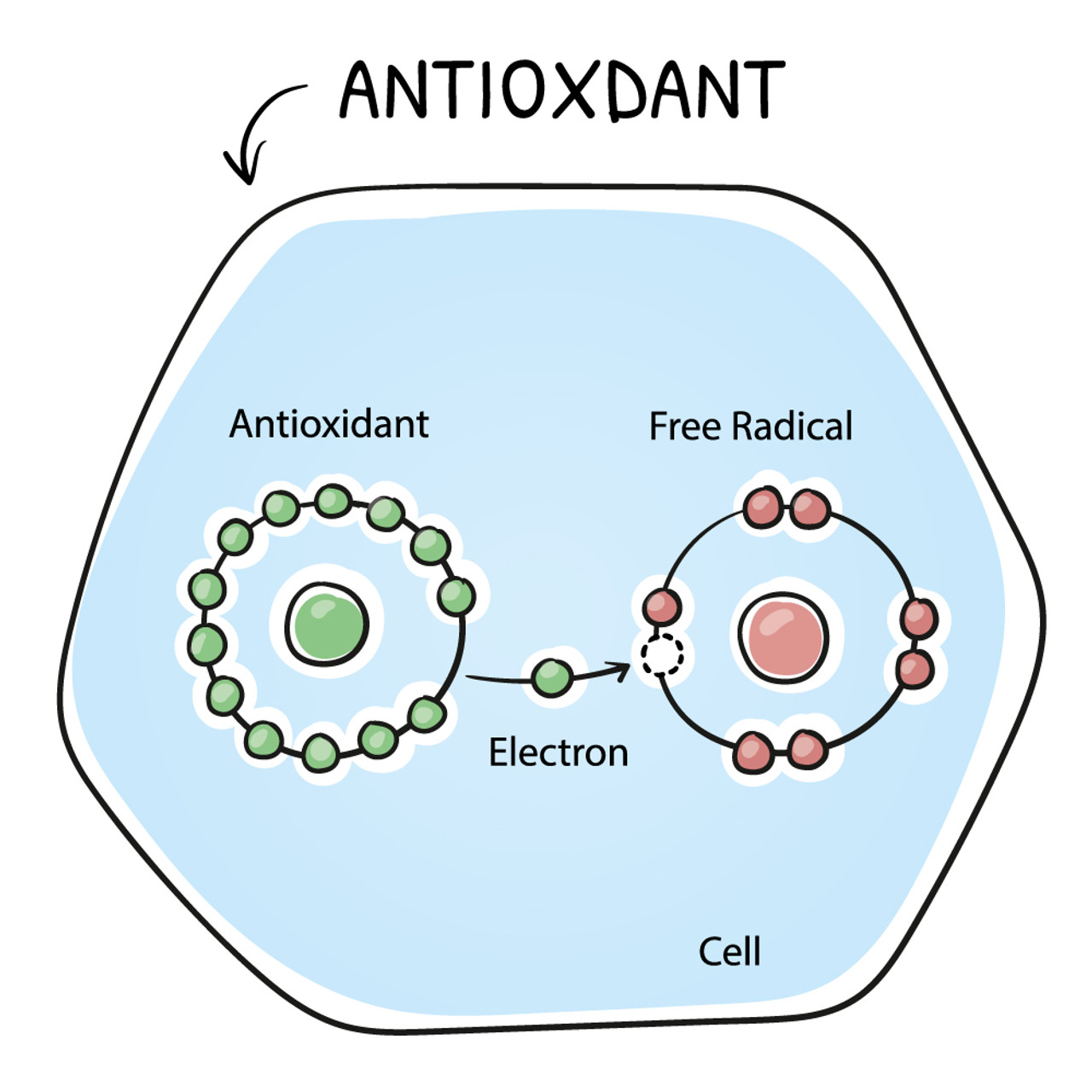Antioxidants, whether used topically or consumed, can assist in defending your skin against free radicals. Abundant in herbs and botanicals, antioxidants play a very important role in helping to prevent damage and aging of skin.
- Highly reactive free radical molecules attack and degrade skin structure
- Antioxidants neutralize the free radical before it can react with skin
- Antioxidants can help prevent acne
- Antioxidants are abundant in plants
- Potent sources include Green Tea, Green Coffee, Yerba Mate, Rooibos, Pomegranate, Acai Berry and other berries, Turmeric, Rosehips, and Spirulina
- Skincare ingredients like petroleum compounds, silicones, and squalane do not contain antioxidants.
What Are Free Radicals and How Do They Happen?
Free radicals are often single oxygen molecules or compounds that contain oxygen in an unbalanced form. Because of the way that oxygen's electrons occur naturally it usually prefers to be bonded to other compounds. When it is alone it has too few electrons, and will constantly search for electrons to replace what it is missing.
You could think of free radical oxygen as someone that has recently gone through a really tough romantic breakup. They are really not happy being alone, and might be prone to get into some really bad rebound relationships just to get by. It might not be a good idea to take them out to a party because they might end up going home with someone who isn't right for them at all. Because they are not really ready to be in a relationship they might also hurt the feelings of that other person. Instead it's better if they can hang out with a good friend who has the emotional resources to hug them while they cry and get them back to feeling good on their own.
Antioxidants are that good friend who has healthy support to give. Antioxidants donate an electron to free radicals, which solves their quest for balance.
Free radicals are generated by exposure to sun and environmental stressors, the daily biochemical reactions in your body, and even excess sugar consumption. Your body cannot function without creating free radicals on a daily basis. Unfortunately these highly reactive molecules can break down your healthy tissues. Free radicals and skin are a bad rebound relationship.
How do Antioxidants Help Prevent Skin Damage?
Free radicals directly interact with and degrade collagen and elastin, the supporting structural fibers of skin. This results in a loss of tone, sagging, and wrinkles. The opportunity for damage occurs every single day.
Free radical damage is one of the prime causes of aging of the human body over time and even a source of disease.
Unsaturated oils in your skin can react with oxygen in the air as well if there is a lack of antioxidants present. Your skin sebum contains fatty acids and squalene. Squalene is a more effective free radical scavenger than your other skin lipids, but when squalene becomes oxidized it gets "sticky" and can cause problems for skin cells. The oxidation of oils in the skin is now being identified as one of the major early factors in the development of acne comedones. The sticky oils cause skin cells to clump together and clog pores instead of exfoliating like they should. Oxidized oils can also cause inflammation in the skin all on their own, as they are just not healthy for your tissues. This combination of clogging and inflammation within pores can start the process of a painful breakout.
When reactive oxygen species damage keratinocytes and other skin tissues it can also trigger the release of inflammatory compounds in the immune system. For people that have rosacea and eczema this can become a nasty cycle. Some initial damage becomes inflammation, which creates even more free radicals and continues the cycle.
In one study people with severe rosacea were found to have lower levels of Super Oxide Dismutase in their tissues. This is a natural antioxidant produced by the body. This is sometimes a chicken-egg scenario where it is hard to know if the antioxidants were low to start with, triggering the problems, or if the antioxidant levels became depleted due to ongoing inflammation. But the answer is simple - provide antioxidants!
Providing antioxidant compounds can reduce the effects of inflammation and speed healing time by neutralizing the byproducts of the many chemical reactions that are occurring.
One of the reasons herbs and botanicals are so valuable in skincare is they almost all contain numerous antioxidant substances. Even vitamins like A, C, and E act as antioxidants.

“Moisturizing” skin is just not enough. If you are not providing antioxidants your skin will accumulate damage no matter how hydrated it is.
How Can You Use Antioxidants to Benefit Skin?
You can put antioxidants on the surface of your skin and you can eat them in foods, drinks, and supplements too. A strategy of doing both these things will have the best results for people with skin disorders and people just hoping to prevent fine lines and keep skin looking its best.
Green tea polyphenols have been found to increase the skin's natural defenses against UV damage, improve microcirculation, and improved elasticity, roughness, and overall hydration when taken at a dose of 1402 mg for 12 weeks.
Some star antioxidants for skin are pomegranate polyphenols, resveratrol, proanthocyanidins, and astaxanthin supplements which gave marked improvement in users skin when taken internally and applied topically.

Fresh, nutritious vegetables and fruits are fantastic sources of dietary antioxidants if you cannot afford supplements. Drink freshly brewed herbal teas instead of sodas and you'll also boost your antioxidant consumption.
What Popular Skincare Ingredients Do Not Have Antioxidants?
If you want to use antioxidants in your skincare to help the health of your skin you will need to shop carefully. Watch out for the following ingredients and problems to make sure you are getting what you pay for.
Processed Oils -
Because antioxidants are fundamentally reactive compounds as well they need to be handled carefully to be most effective. Oils that are processed with heat lose a substantial amount of antioxidant content. Most of the oils used in the beauty industry have been heavily processed to be "water white" and odorless. This means that most of the exciting-sounding oils advertised in mass market beauty products are devoid of antioxidants and do not have the benefits they advertise.
Old Products -
Very old beauty products will also lack antioxidants, and may contain harmful byproducts as the ingredients break down. Do not save foods or beauty products for years in your cupboard and expect them to still offer antioxidant benefits. Skincare products should be used when fresh.
Petrochemicals and Silicones -
Petrochemical ingredients and silicones do not have any natural antioxidant activity. This means that something like petroleum jelly offers no antioxidants to skin.

Squalane is Not an Antioxidant -
There is often confusion about squalane and squalene in skincare. Squalene is the antioxidant, emollient substance produced by your skin and that naturally occurs in olives and shark oil. Because it is an antioxidant it is also inherently unstable and prone to react with oxygen. When squalene becomes oxidized it becomes sticky and causes skin problems. This means that squalene is not used in skincare. Only the stabilized, fully saturated version, squalane is used. Squalane is nonreactive because of its chemical structure, and therefore does not offer antioxidant benefits. It is still a good skin emollient, though.
The dose also matters. Many beauty companies use only trace quantities of trendy ingredients so they can claim that ingredient on their ingredients label, but it is not enough to be effective. Shop carefully and inquire about percentages of active ingredients.
To get the best antioxidant content in your products choose companies that use high levels of raw botanicals. The first part of the ingredients list should be filled with natural, unprocessed ingredients. Freshness dating should be included to ensure your products were made recently. Oils should have natural colors like amber, green, gold, and orange that indicate the presence of natural carotenoids and phytonutrients.
Disclaimer: The information contained on this site is general in nature and for informational purposes. It is not meant to substitute for the advice provided by your own physician or other medical professional. None of the statements on this site are a recommendation as to how to treat any particular disease or health-related condition. If you suspect you have a disease or health-related condition of any kind, you should contact your health care professional immediately. Please read all product packaging carefully and consult with a healthcare professional before starting any diet, exercise, supplementation or medication program. Cosmetic products have not been evaluated by the Food and Drug Administration and are not intended to diagnose, treat, cure, or prevent disease.


